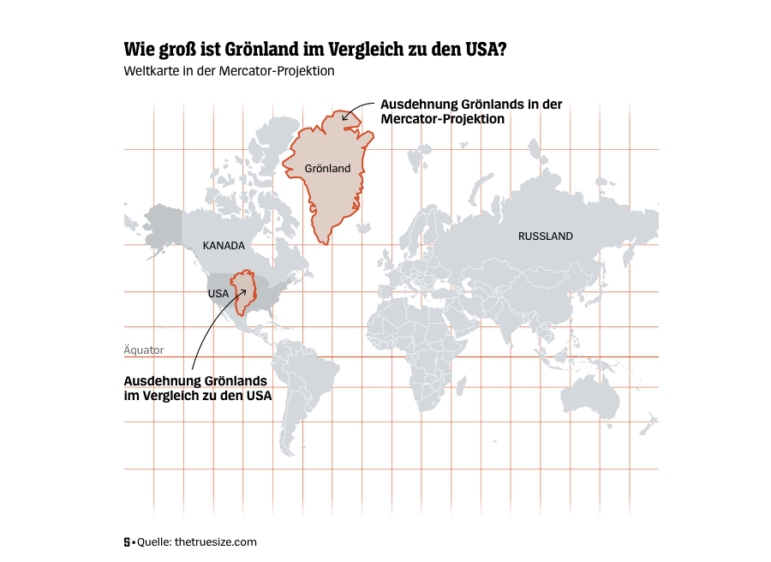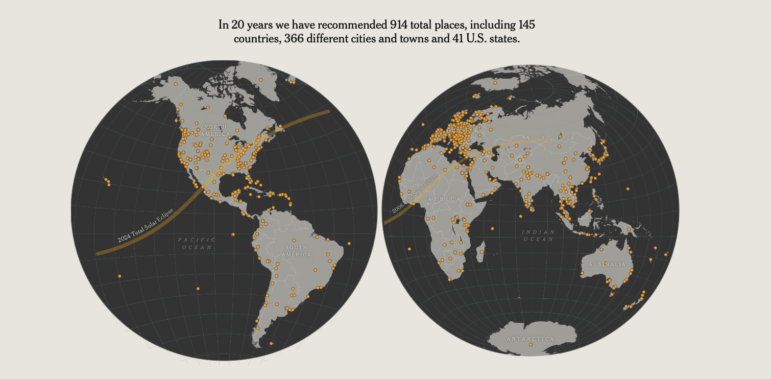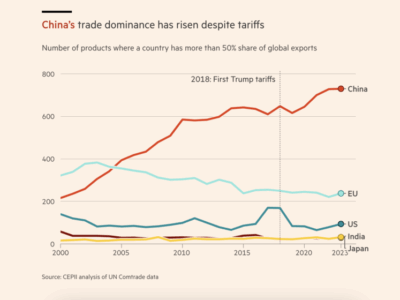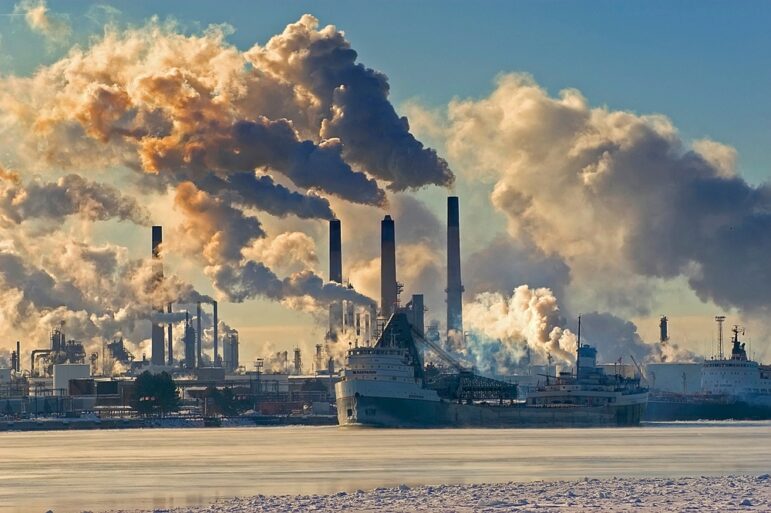
Though we are only two weeks in, 2025 has already been eventful. From war and conflict to environmental disasters, there have already been a number of notable events for data reporters to delve into. But the devastating wildfires that have been ravaging southern California have received the most attention from data teams around the world — so much so that we selected not one, but two stories about the environmental disaster that is already the largest on record in the region. This edition of our Top 10 in Data Journalism, which considered stories from the start of the year up to January 12, also highlights a BBC analysis of global temperature data in 2024, a Reuters investigation into how Iran is evading oil sanctions, a Serendipia report on fentanyl production in Mexico, and an analysis by The New York Times of its own travel column.
Wildfires Rage Out Of Control In Los Angeles
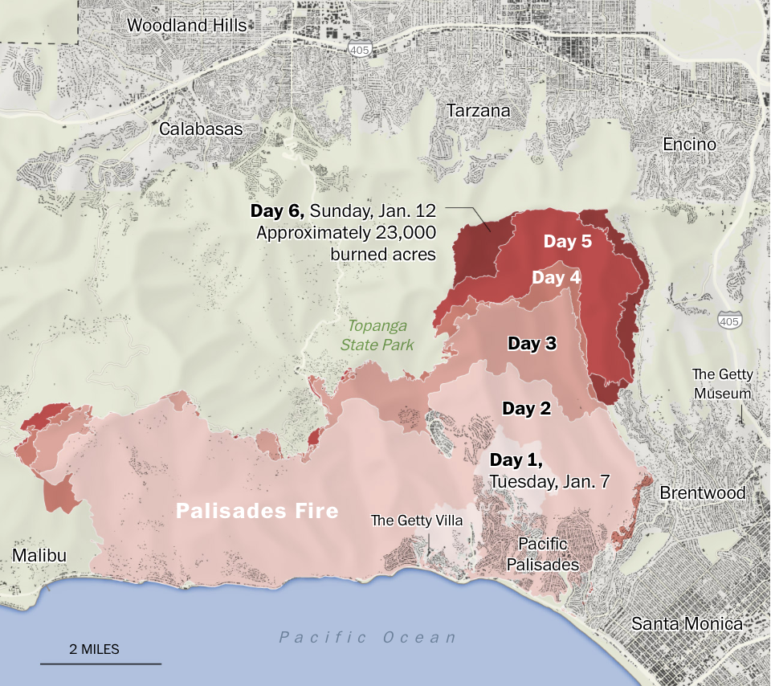
The Washington Post mapped the spread of the Palisades fire in northern Los Angeles, California. Image: Screenshot, Washington Post
For more than a week, a series of large-scale wildfires have been ravaging the Los Angeles metropolitan region and surrounding areas — leaving more than 25 people dead and thousands homeless. Among the displaced are a number of A-list celebrities, and the blaze, which burned out of control for days, has also threatened many of the city’s iconic landmarks. The Washington Post published maps and satellite images that showed, day by day, the progress of the Palisades and Eaton fires, which together are expected to be the most destructive in the history of Los Angeles County. In addition, the report also provided a detailed explanation of how wildfires form and spread, and how the so-called Santa Ana winds are making the disaster that much worse.
Homeless and Uninsured
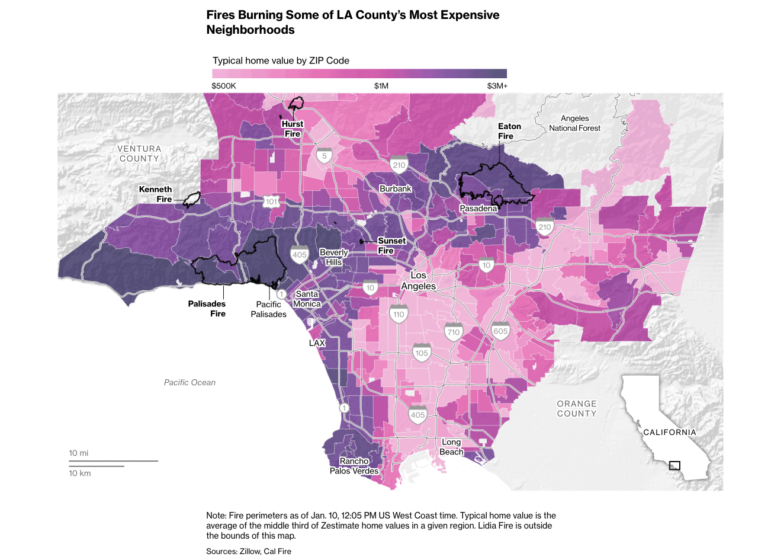
This map charts how wildfires have impacted some of the most expensive parts of Los Angeles. Image: Screenshot, Bloomberg
The recent wildfires have now destroyed or damaged more than 12,000 structures in Los Angeles County — and experts estimate that insured damages could top US$20 billion, making it the costliest wildfire in US history. According to The LA Times, before the fire broke out, several insurers had capped, canceled, or greatly increased the cost of home insurance policies in Pacific Palisades, Altadena, and other fire-prone areas. In this piece, reporters from Bloomberg explained the deepening crisis in California’s property insurance market and asked whether a single event like this could cause insurers to become insolvent or even more cautious about insuring homes and businesses in at-risk communities. According to the report, “the escalating exodus of private insurers has left the state-backed insurer of last resort… in a precarious position.”
The World Keeps Getting Hotter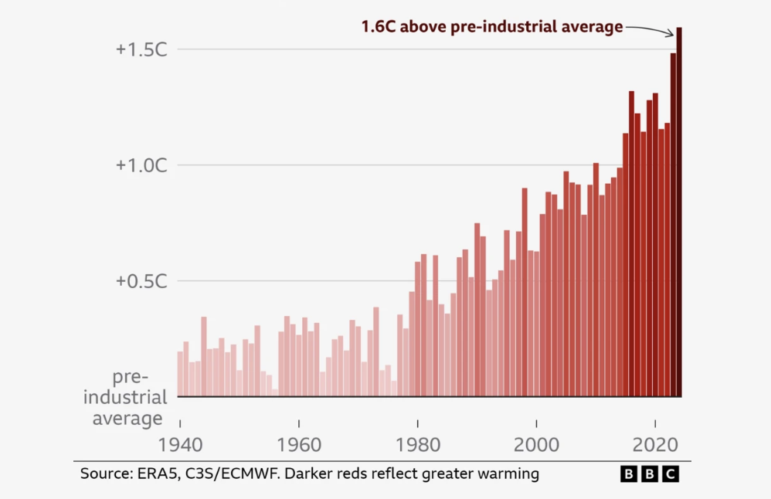
The year 2024 was the first one to surpass 1.5C above the pre-industrial period average, according to this report on the latest data. Image: Screenshot, BBCThe devastating images from California have provided sobering evidence for the announcement that 2024 was the hottest year on record. It was also the first year to exceed the 1.5°C global warming limit — the target threshold for global temperature increases compared to the pre-industrial period established by the Paris Agreement in 2015. According to the BBC the latest data does not show that the international target has been broken — as it refers to a long-term average, over decades — but it is enough to worry scientists and world leaders everywhere. The report featured a map that showing how the world has warmed and a series of graphs showing the global average temperature rise over time and the distribution of daily differences in global air temperature in 2024, the latter stylized in a beautiful — yet ominous — graph.
How Iran Evades Oil Sanctions
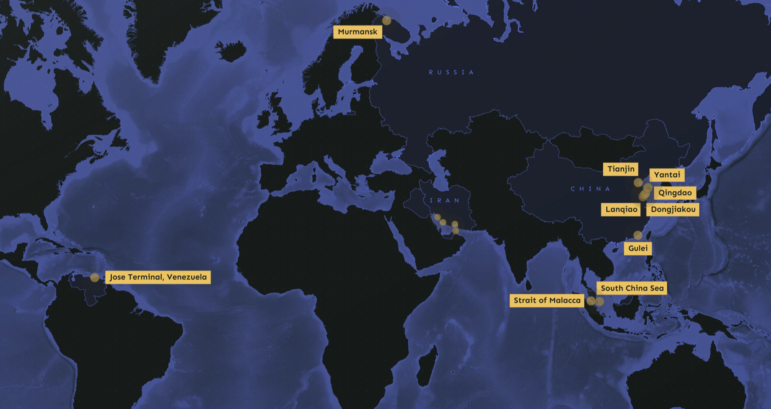
Reuters mapped the key locations where vessels transferred oil, from Iran and the United Arab Emirates, to Venezuela, Murmansk, and a string of ports in China. Image: Screenshot, Reuters
In a highly detailed special report, a team at Reuters used mapping and satellite imagery, alongside scanned documents and email excerpts, to show how, despite a raft of sanctions imposed by the West, Iran has built a multibillion-dollar global oil trade. The investigation stems from a series of leaked emails that exposed granular details about the day-to-day workings of an Iranian company. According to the leak analysis, from March 2022 to February 2024, the company helped deliver 18 different sanctioned oil cargoes from Iran to Venezuela, northern Russia, and a series of ports in China via a ghost fleet of 34 vessels. According to the investigation, the total amounted to nearly 20 million barrels of oil, valued at about US$1.7 billion. To do this, the company and its partners allegedly transferred oil from ship to ship, falsified documents, painted ships with new identities, and falsified tracking signals — all to avoid any trace of their relations with Iran.
Greenland in the Spotlight
Donald Trump will be sworn in as US president for the second time on Monday, but even before his inauguration, he stirred controversy by expressing his apparent desire to seize the Panama Canal and annex Greenland and Canada. According to the German outlet Der Spiegel, Trump has previously expressed an interest in Greenland, an autonomously-governed Danish island, referring to its “huge” landmass a number of years ago. “Donald Trump loves pretty much everything that is big,” the reporters noted. But they went on to explore how the impression of Greenland as so very big is the result of a distortion in the so-called Mercator projection — the most widely used version of the world map — which greatly enlarges regions close to the poles. Der Spiegel even overlaid a map of Greenland on a map of the United States, to demonstrate how the real size of the island would fit inside the continental US four times.
Is Japan’s Extinction Clock Ticking?
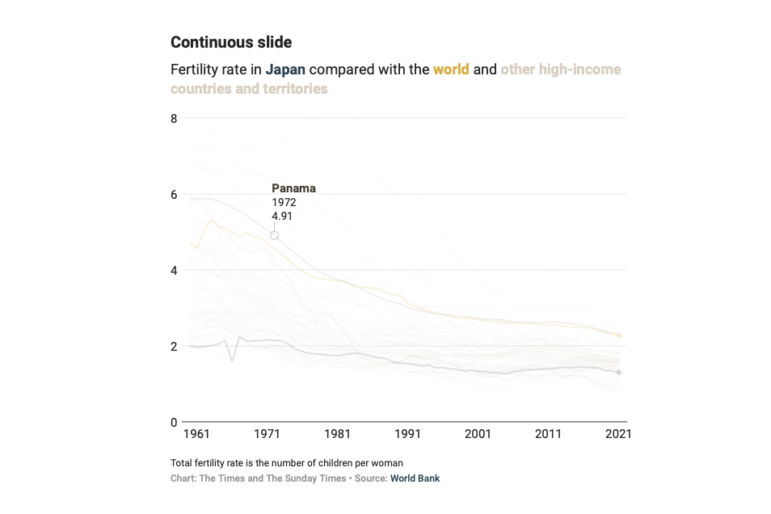
Birth rates are falling globally but Japan has among the lowest in the world. Image: Screenshot, The Times
Could the world’s fourth-largest economy be on the brink of extinction? In this report, The Times explained how, according to experts, Japan’s extremely low birth rate, combined with its aging population, is putting the country on a dangerous path. In 695 years, at current rates of decline, only one child under the age of 14 will remain. The Times explains that despite being the target of numerous government policies promoting dating, marriage, and better work-life balance, the Japanese birth rate has reached an all-time low. According to the report, the 2.3% drop in the number of Japanese children in April 2024 alone “has brought the demographic apocalypse scenario forward by 100 years compared with the 2023 estimate,” and the country could become the first to go extinct due to a low birth rate.
Fentanyl’s Rise in Mexico
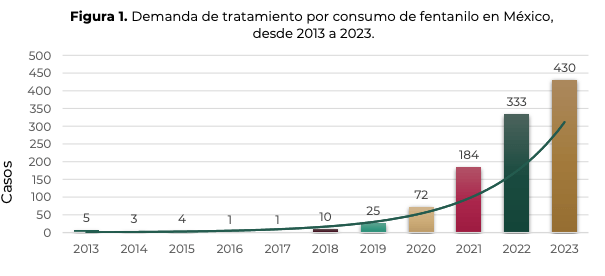
A chart showing increasing demand for treatment for fentanyl addiction in Mexico. Image: Screenshot, Serendipia
Mexican President Claudia Sheinbaum has said there is no fentanyl consumption crisis in the country. But in this report, Serendipia, an independent data journalism outlet, used government data to interrogate her claim. Reporters found that, although official data on drug use in the country is scarce, the increase in fentanyl use nationwide has been documented by the Mexican government. Using several graphs, the story shows the increase in the number of fentanyl seizures by the authorities and how the number of fentanyl cases seen in rehabilitation centers increased almost 90 times nationally, between 2013 and 2023. The report also states that, according to the National Commission on Mental Health and Addictions, many fentanyl users in Mexico are not even aware that they are using it.
Risks of Being LGBT in Russia
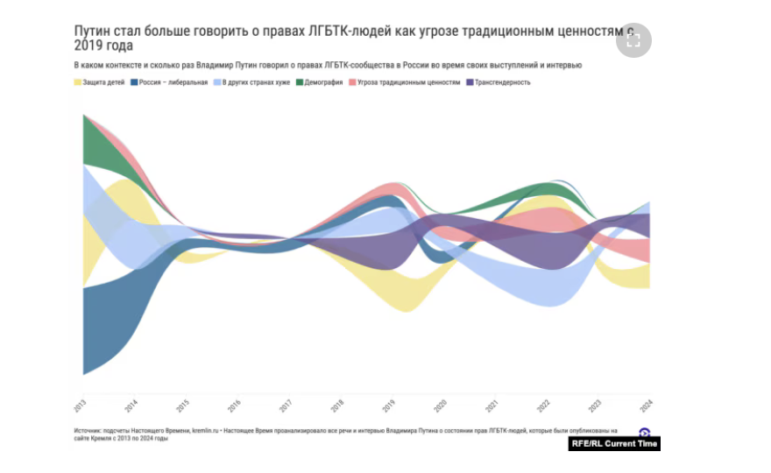
Reporters analyzed Putin’s official speeches since 2013. They noticed an uptick in the number of times he spoke about trans people (deep purple), traditional values (coral), and a decrease in references to Russia as a “liberal” country (blue). Image: Screenshot, Current Time
This time last year the “international LGBT movement” was declared an extremist organization in Russia. In this special report, Current Time, a channel created by RFE/RL, used data to explain what happened in the months after the designation and to explore how the situation has been aggravated in recent years by the homophobic rhetoric of the Russian authorities and President Vladimir Putin. According to data collected, there were 32 raids on LGBTQ-related clubs and spaces last year, 61 administrative proceedings for displaying “extremist symbols” related to the LGBTQ movement, and a 20% increase in the number of requests for psychological help from LGBTQ people. Current Time also analyzed Putin’s interviews and speeches from 2013 to 2024, and says that from 2019 “the general narrative began to change,” becoming increasingly hostile and starting to frame LGBTQ rights as a threat to traditional values.
Two Years On: The Coup Attempt in Brazil

Crunching the numbers, reporters were able to find out how many of those who supported the coup attempt had been sentenced, and for how long. ‘Pena’ — in the left column — shows the length of prison sentence given to those convicted of the most serious offenses. Image: Screenshot, Poder360
January 8 marked two years since the attempted coup in Brazil. As the reckoning continues, reporters at Poder360 issued this report detailing how the subsequent legal cases have unfolded. Using data from the Federal Supreme Court, they found that more than 1,500 lawsuits have been filed against those involved in the vandalism linked to the coup attempt. Nearly two-thirds of cases (more than 900) have already been resolved, resulting in fines, convictions, and just a handful of acquittals. Court data shows that R$1,791,402 (around US$300,000) has been paid in fines so far. Among those facing the most serious charges, sentences range from 3 years to 17 years, and there are also currently 155 people in prison.
Infectious Diseases and Climate Change in South Africa
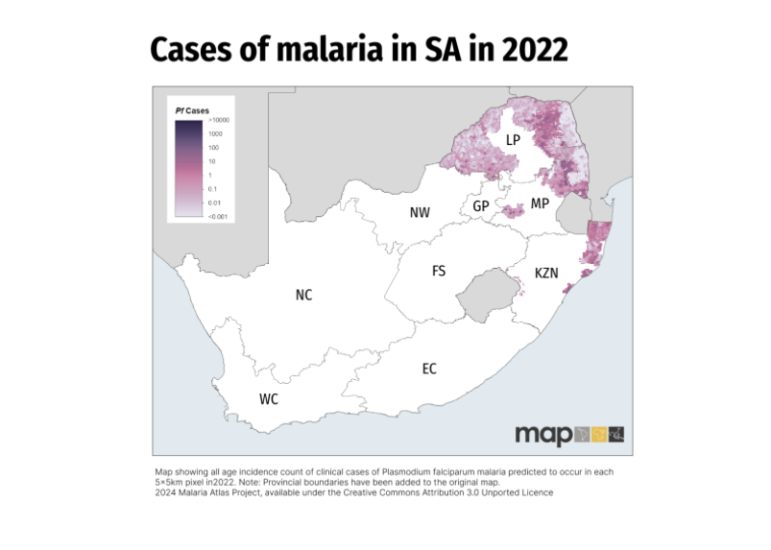
In South Africa, only a handful of areas currently experience malaria outbreaks — most near the border. Image: Screenshot, The Outlier
The Outlier used the southern hemisphere’s mosquito season to reflect on how climate change could affect the spread of infectious diseases, with a special focus on South Africa, where the outlet is based. The report featured a map of the country, showing how malaria cases are concentrated near the borders with Zimbabwe and Mozambique, and a graph showing how thousands of people die every year due to the disease in many other African countries. The report also features data on dengue fever — last year saw record high numbers — and the relationship between cholera and extreme weather events on the continent. According to The Outlier, rising temperatures could make it harder to tackle mosquito-borne diseases, such as malaria and dengue, which thrive in warm-weather locations and could appear in places that were previously unaffected, while climate change also increases the frequency of extreme weather events, such as floods.
Bonus: Places To Go
Every year The New York Times publishes Places to Go, a special report with tips for dozens of different travel destinations. This year, as the series turns 20, the newspaper performed an interesting analysis of the numbers from its own column to examine how the world — and the way people travel — has changed since the column debuted in 2005. In total, 145 countries from seven continents — including Antarctica — have featured in the destination suggestions, with a predominance of countries from the Northern Hemisphere. The United States appeared on the list the most, at 155 times, followed by Italy (29 times) and France (28 times).

